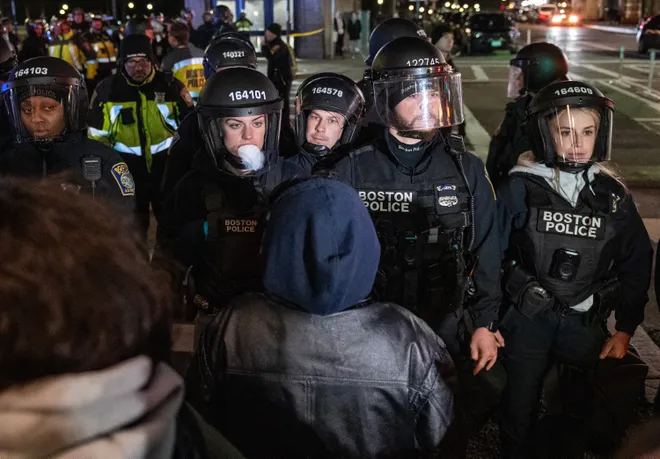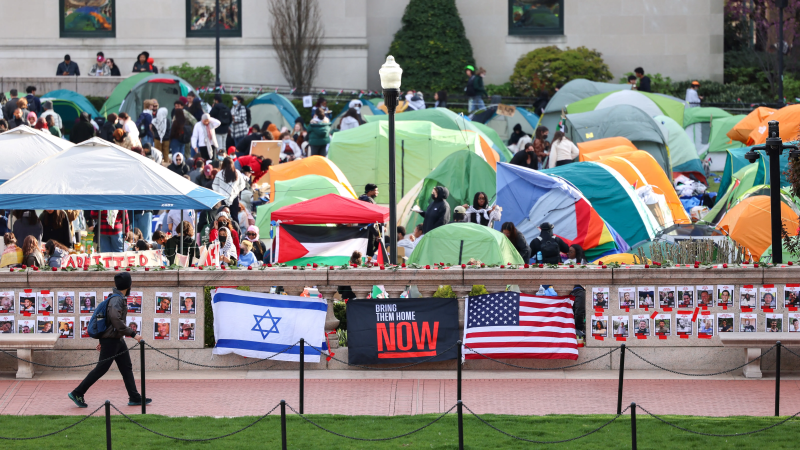Columbia protesters face deadline to end encampment as campus turmoil spreads: Live updates
NEW YORK − Protesters at Columbia University in New York, an epicenter of growing student dissent against the war in Gaza, faced a deadline Thursday to dismantle their encampment as protests and arrests intensified across the nation.
At Columbia, scene of more than 100 arrests in recent days, school President Minouche Shafik warned students that if the tents aren't moved by Friday "we will have to consider alternative options" for clearing the area and restoring calm to campus. House Speaker Mike Johnson lashed out Thursday at Columbia protesters who booed him during his visit to the school a day earlier. Johnson had criticized students and faculty who participated in the protest and called for Shafik's resignation.
"Hamas backed these protests at Columbia," Johnson said in a social media post. "The things that have happened at the hands of Hamas are horrific, and yet these protestors are out there waving flags for the very people who committed those crimes. This is not who we are in America."
A few feet from the encampment, Nate Twersky, a mechanical engineering student, was on campus for the first time in a few days. Twerky, who was planting small Israeli flags, said he had feared he would face antisemitic language and threats. The last time he helped place Israeli flags there, soon after Oct. 7, they were taken down, he said.
"We hope that doesn't happen (again)," he said. "I'm not confident."
At Emory University in Atlanta, The Emory Wheel reported officers from the Emory Police Department, Atlanta Police Department and Georgia State Patrol "began using gas and arresting protesters" Thursday morning, a few hours after protesters set up tents in the school's Quadrangle. Videos from the scene showed chaos as police arrived and students began running. One student appeared to be held down by three officers.
The Council on American–Islamic Relations in Georgia condemned the use of force at Emory.
"Protesters shared a day of cultural learning and community despite which Emory deployed excessive use of force, tear gas, and rubber bullets," CAIR said in a social media post.
Demonstrators across the nation are protesting the civilian death toll in Gaza, where more than 34,000 people have died since Israel's invasion that followed a Hamas-led attack that killed almost 1,200 people in Israel. Students oppose U.S. military aid to Israel and want their schools to stop investing endowment money in Israeli companies.
Columbia says encampments will shrink:Scores of protesters arrested at USC

Developments:
∎ At UCLA, Students for Justice in Palestine set up an encampment Thursday on Royce Quad. "We are not leaving until our demands are met," the group said in an Instagram post.
∎ Two graduate students at Princeton University were arrested for trespassing and tents were taken down Thursday after scores of students attended a rally, the university said.
∎ About 70 students from Washington, D.C.-area universities including Georgetown and the George Washington University formed an encampment of 25 tents on GW’s campus early Thursday morning. They are protesting their schools’ investment of funds in companies doing business with Israel, the Georgetown Voice reported.
∎ In Boston, Emerson College President Jay Bernhardt canceled classes Thursday "as we respond to, and process, the events of last night." Police spokesperson Michael Torigian said 108 arrests were made and four officers injured late Wednesday when police took down an encampment. Emerson Students for Justice in Palestine was encouraging protesters to rally at police precincts across the city.
∎ The University of Southern California declared its campus closed and asked the Los Angeles Police Department to clear a demonstration. Campus police took down an encampment and LAPD said late Wednesday that 93 people were arrested for trespassing and one for assault with a deadly weapon. No injuries were reported.
Troopers in riot gear break up University of Texas protest
At the University of Texas in Austin, the Palestine Solidarity Committee posted a call to "Stand with the Arrested, Stand with Gaza," urging professors and students to join a rally Thursday. On Wednesday, state troopers in riot gear and police on horseback broke up a protest at the school, and 57 people were booked into the Travis County Jail in connection to the protest, Travis County sheriff's office spokesperson Kristen Dark said.
Pavithra Vasudevan, a professor at UT, said students had planned an educational event about Palestinians for the afternoon and had asked faculty members to lead workshops. Vasudevan said he was present when police began arresting protesters.
“The president and university administration chose to militarize our campus in response … to students gathering to express themselves,” Vasudevan said.
Michigan State president considering action on encampment
At Michigan State University, a student coalition set up a Gaza solidarity encampment, asking for the school to divest from Israeli firms and weapons manufacturers. Students from the coalition have attended every Board of Trustees meeting since October pressing for the change in investments.
MSU President Kevin Guskiewicz told the State Journal, a sister paper of USA TODAY, that he respected student rights to protest but was concerned about safety. He said he would follow local ordinances in deciding whether to take aaction.
"I don't want to be known as a place that has shut down free speech, or one's ability to express themselves," he said. "College campuses have been the epicenter for activism and protests for decades."
− Sarah Atwood, Lansing State Journal
Brandeis University reaches out to Jewish students elsewhere
Brandeis University, a Massachusetts school founded by the American Jewish community to counter antisemitism 76 years ago, is extending it's transfer application period to May 31 because of the "current climate" at other schools. School President, Ron Liebowitz issued a statement Tuesday saying it is "unacceptable" that protests on some campuses have resulted in Jewish students being attacked physically and verbally because they are Jewish or support Israel, he said.
He said the school welcomes "Jews and students from every background" who are looking for an educational environment striving to be free of "Jew-hatred."
"Brandeis has been committed to protecting the safety of all its students," Liebowitz said. "In the current atmosphere, we are proud of the supports we have in place to allow Jewish students to thrive."
Hamas, Iran applaud US protests:Militant groups offer public support
Hamas, Iran express support for US protesters
Palestinian militant group Hamas and Iran's Supreme Leader Ayatollah Ali Khamenei publicly applauded the growing number of anti-Gaza war protests and encampments that have sprung up on college campuses from California to Massachusetts and have become a flashpoint in the U.S. Izzat Al-Risheq, a member of the militant group's Political Bureau, said Wednesday that President Joe Biden's administration is violating the rights of students and faculty members and arresting them, "because of their rejection of the genocide of Palestinian people" in Gaza.
Khamenei issued a statement on social media celebrating the flying of a Hezbollah's flag in the streets of the U.S. "The people of the world are supporting the Resistance Front because they are resisting & because they are against oppression," the post read.
− Romina Ruiz-Goiriena

Why are students protesting on college campuses?
The protesters opposed to Israel's military attacks in Gaza say they want their schools to stop funneling endowment money to Israeli companies and other businesses, like weapons manufacturers, that profit from the war in Gaza. It is not easy to define what an "investment" in Israel entails, said economist Sandy Baum, a senior fellow at the Urban Institute who studies college finances. She said bigger investments are more obvious than smaller ones tucked away in mutual funds.
Columbia University, a focal point for the protests, has one of the largest school endowments in the nation at more than $13 billion.
"Why is our money being used to fund bombs overseas?," said Layla Saliba, a student protester researching endowment investments with the group Columbia University Apartheid Divestment. "Let's reinvest this money in our community instead."
− Claire Thornton
Contributing: Jeanine Santucci, USA TODAY; Lily Kepner, Austin American-Statesman; Reuters
Disclaimer: The copyright of this article belongs to the original author. Reposting this article is solely for the purpose of information dissemination and does not constitute any investment advice. If there is any infringement, please contact us immediately. We will make corrections or deletions as necessary. Thank you.







